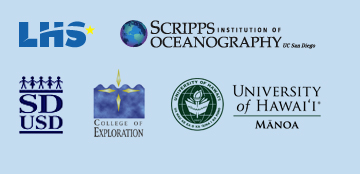Curriculum materials have moved. Please visit the Resources section of reflectiveeducators.org website
Course Overview
Communicating Ocean Sciences to Informal Audiences (COSIA) involves scientists at colleges and universities working with their local aquariums and marine science centers to deploy undergraduates and graduate students to teach the public about current discoveries in ocean sciences.
This course provides undergraduate and graduate students the opportunity to explore and apply current research on learning and instructional strategies geared toward informal learning environments, and engages them in communicating ocean sciences. Students, working with university professors and educators at the informal science education institutions, have the opportunity to design an activity to be implemented at an aquarium or science center. A teaching manual and resource guide providing in-depth instructions, session write-ups, and materials lists for teaching the course.
The students say they are learning to refine complex scientific concepts and communicate the important points to the broader public. The benefit they speak of mostly is the confidence building experience of being introduced to the theory and then applying it in a safe environment. The course is like no other course they take in their career. -COSIA Instructor
This was a great course that I would recommend all graduate students take at some point during their education. This was a very positive experience and the most applicable and useful class that I have taken to date. -COSIA Student
Personally, I felt like I was learning along with the students. Professionally, I am a better teacher in my other classes because of COSIA. Institutionally, our students are much better prepared for their future job search. -COSIA Instructor
The COSIA Project
Development and field-testing of this course was a major initiative of the Communicating Ocean Sciences to Informal Audiences project that was funded by NSF Informal Science Education (Grant ESI-0540417; 2006-2009). The project involved five pairs of informal science education institutions and nearby colleges or universities to create strategic, long-term three-way partnerships to improve ocean science education nationwide.
Project Goals included:
- Provide a model for establishing substantive, long-term partnerships between scientists and informal science education institutions to meet their respective educational outreach needs.
- Provide future scientists (college students) with experiences delivering outreach that acquaint them with the role informal institutions play in providing memorable experiences for the public and promoting the broader impact of research.
- Provide diverse role models and inquiry-based ocean sciences for children and families visiting informal science institutions.
- Create a series of handbooks including: an Instructors' Guide for the COSIA course, and an Informal Science Educators' Handbook.
- Create a project web site to disseminate resources, results, and a bank of informal marine education activities.
COSIA Partners
These partners exemplify a diverse array of universities and informal learning environments.
COSIA Activities
COSIA Partners created, tested, and documented a number of hands-on activities to explore ocean sciences. These activities were designed to be used as facilitated cart-based interactions for use on gallery floor in informal science education institutions. Download and try them out:
COSIA Network
In 2009, the NSF Informal Science Education (ISE) Program awarded the Lawrence Hall of Science/COSEE California $2.8 million over four years to further develop and strengthen the efficacy of the partnerships that began as part of the COSIA Project. The COSIA Network aims to:
- develop a cross-disciplinary community that brings together ocean and climate scientists in institutions of higher education and educators in informal science education institutions to communicate ocean sciences concepts and research to the public;
- foster long-term relationships between scientists and educators across the country as they draw on one another’s expertise; and
- build the capacity of scientists and educators by:
- expanding the number of universities teaching the college course;
- conducting regional professional development programs for informal science educators;
- offering workshops for scientists interested in education and outreach; and
- working with universities and informal science environments, such as 4H clubs, to bring ocean sciences to inland areas of the country.
Reflecting on Practice
In 2009, the Lawrence Hall of Science/COSEE California received a two-year, $300,000 award from the Institute of Museum and Library Services (IMLS) for the Museum Educators
Reflecting on Practice program based on a successful resource and model that the Hall created through the COSIA course.
Reflecting on Practice is a professional development program that aims to:
- engage informal science educators in extensive, ongoing study of science pedagogy and reflective practice grounded in research and theory specific to informal learning environments
- foster habits of continued professional learning and reflection; and
- build professional learning communities among educators within their institutions, as well as across institutions in the Network.
Informal science educators attend a Coaching Workshop to learn the program and connect with educators from other institutions. Workshop participants then return to their institutions and implement the program with their colleagues, and thus build capacity and expertise from within.
Learn more. Become part of the community.
This material is based upon work supported by the National Science Foundation under Grant No. 0540417. Any opinions, findings, and conclusions or recommendations expressed in this material are those of the author(s) and do not necessarily reflect the views of the National Science Foundation.


